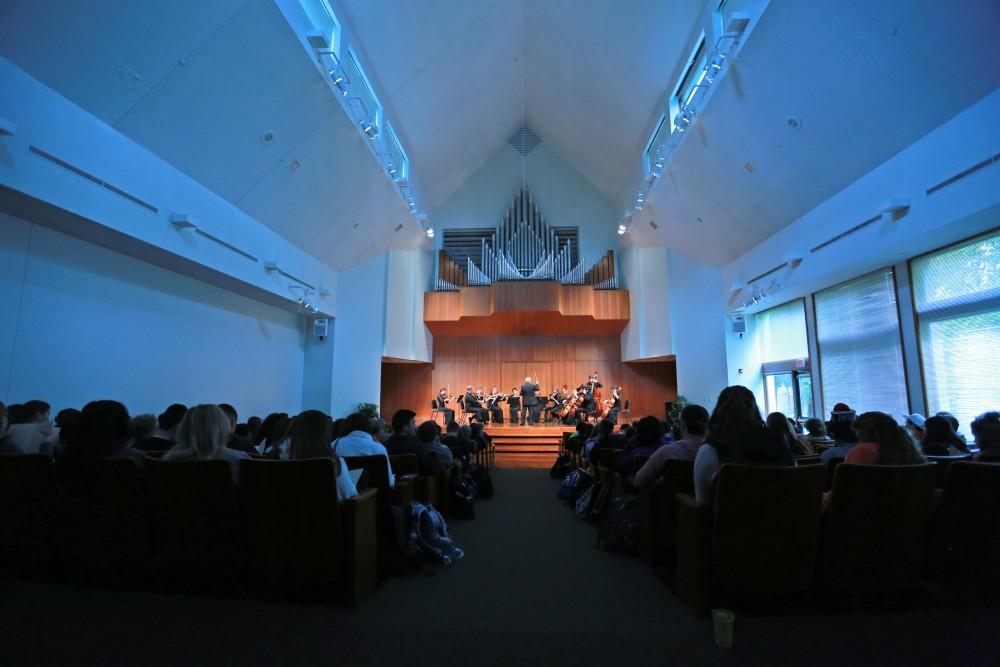Arts at Noon breaks down language barrier with music

GVL / Kevin Sielaff – Arts at Noon features the Chamber Orchestra Kremlin Oct. 14 inside the Cook DeWitt Center on Grand Valley’s Allendale campus.
Oct 19, 2015
Henry Wadsworth Longfellow said “music is the universal language of mankind.” With a visit from the Chamber Orchestra Kremlin on Oct. 14, audience members at Grand Valley State University’s Arts at Noon series experienced this universal language in the flesh.
The Chamber Orchestra Kremlin was founded in 1991 by its music director Misha Rachlevsky and has performed 1,800 concerts in 24 different countries since then. They have produced over 30 CDs, which have won the Diapason d’Or award in France, the Critics Choice in London’s Gramophone, the Critics Choice in The New York Times and Record of the Year in Hong Kong.
Rachlevsky said that there are small differences in performing for audiences around the world, but the differences aren’t substantial when it comes to playing and listening to the music.
“Such differences all become meaningless the moment a performance begins,” Rachlevsky said. “For at this moment everyone becomes part of an entity called ‘the audience’ and their experience is universal: some performances hold the audience; others do not.”
The Arts at Noon series is held in the Cook-DeWitt Center, and is free and open to anyone. Rachlevsky said the performance at GVSU was unique because of the time of day and the fact that many audience members are students.
“There are people with a kind of trained soul (for music),” Rachlevsky said. “Trained acceptance of something, ability to hear, ability to feel something that is not necessarily described. Those are people that for us, are the best audience. Because there is something to communicate to and get from. That can be at any age, not necessarily just students.”
Principal double bass player, Alexander Pavlov said that there is no difference between performing in the U.S. and performing in Russia, but said he felt a difference in performing at an earlier time of day than concerts are usually performed.
“The morning is a good time to practice because your brain is cold, mind is cold,” Pavlov said. “Evening is a better time for music. Evening mind is a little bit more feeling and emotional. It’s a good time to give emotions inside you to others in the audience.”
The Chamber Orchestra Kremlin performed “Serenade in E minor for String Orchestra, Op. 20” by Edward Elgar, “String Quartet No. 8, Op. 110” by Dmitri Shostakovich transcribed for chamber symphony, “Contrapunctus No. 1 from ‘The Art of the Fugue’” by Johann Sebastian Bach and surprised the audience at the end with a tradition the orchestra jokingly calls “Russian Roulette.”
The tradition involves Rachlevsky asking for a volunteer from the audience. The volunteer is then asked to select a member from the orchestra to perform a solo accompanied by the rest of the chamber orchestra. At Wednesday’s performance, the audience member selected Pavlov to solo on his double bass.
“Yesterday or the day before I learned that the guys call it Russian Roulette,” Rachlevsky said. “It was interesting only because we’ve done (Russian Roulette) 11 times now and out of 11 (Pavlov) is the absolute champion because he was selected three times.”
Rachlevsky came up with the idea for the audience to have the chance to choose a soloist, after by chance running into and meeting composer John Corigliano at LaGuardia airport. After connecting with Corigliano, the composer sent over a piece which Rachlevsky then arranged to include solos for each member of the orchestra. Rachlevsky now uses the piece and audience participation to give each player a chance to show off their skills.
“I have very strong players; it’s very difficult to get in our orchestra because you have sort of spotless expectation for quality in Moscow,” Rachlevsky said. “I want everybody (to play a solo), but you can’t put everybody in the program. So I came up with this Russian Roulette and it’s a lot of fun.”

























